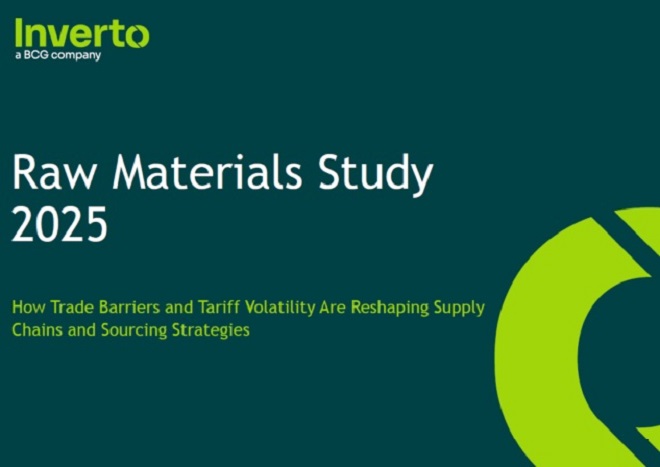UK businesses face rising raw material prices as supply chains face new stresses, shows new research by supply chain management consultancy Inverto, part of Boston Consulting Group.
81% of businesses currently source raw materials from regions impacted by tariffs – notably the US and China.
However, Inverto’s research finds that only 45% of businesses have taken tangible steps to adapt their procurement strategies in response to these pressures.
Raw materials prices now a major risk factor for UK businesses
The study reveals that tariffs are now a structural supply chain risk for many sectors. Many businesses believe the impact of tariffs on supply chains and costs will worsen over the next year. For 45% of businesses, raw materials account for over 40% of their total procurement costs.
According to Inverto’s 2025 Raw Materials Study, 77% of companies expect raw materials prices to rise in 2025 – up 12 percent from 2024. Price increases are seen as especially likely in categories like chemicals (21% of businesses experiencing price increases) and iron & steel (19%). This is followed by crude oil, aluminum and agricultural products (17% each). Rare earths (16%) and plastics (13%) also rank high in both price and supply risk.

Says Sacheev Hanoomanjee, Managing Director at Inverto (pictured right) : “With commodity prices increasing and availability becoming more volatile, procurement is becoming key to business competitiveness. Our survey shows that businesses now see tariffs as the biggest external threat to business performance – far ahead of geopolitical instability and commodity prices.”
Despite businesses recognizing the risks, many of the most effective measures remain underused. These steps include ‘substitution’, where businesses switch to an alternative raw material to maintain operations and fulfill orders. While 31% of respondents see substitution as a key lever, only 21% have implemented it in practice.
Tariffs creating direct and indirect challenges for UK businesses
While tariffs are cited as the single most impactful global trade barrier, they are triggering even more direct and indirect challenges:
- 39% of businesses report export-related tariff costs
- 38% cite broader trade disruptions
- 37% face increased supplier costs
- 36% report being impacted via subsidiaries operating in affected market
Most businesses are exposed to trade-related risk, but strategic readiness remains limited:
- Only 38% of businesses have established dedicated tariff monitoring teams
- 38% are diversifying their supplier base
- 35% are seeking exemptions or alternative trade routes
- 34% are stockpiling critical materials
Even fewer businesses have adopted long-term structural responses: just 32% plan to regionalize their supply chains while a further 32% aim to restructure global operations by 2030. One in four companies still has no clear plan in place.
The six key levers UK businesses can use to protect their raw materials supply
To deal with the cost and supply pressures on their raw materials needs, Inverto recommends that UK businesses make use of six priority levers:
- Implement dual or multi-sourcing strategies across critical material categories to reduce overreliance on a single supplier
- Regionalize critical supply chains to reduce global exposure to countries at high risk of further tariff increases
- Collaborate with R&D on material substitution early in product design to reduce dependence on large quantities of certain raw materials for manufacturing
- Align procurement with innovation processes to secure sourcing at the development stage
- Establish trade risk governance, supported by digital tools, to make informed long-term decisions on procurement and anticipate upcoming supply chain shocks
- Use pricing models that absorb volatility, such as index-linked contracts
Adds Hanoomanjee: “Procurement is now a business-critical function that goes beyond cost optimization. Companies that turn risk awareness into structural resilience will be better positioned for sustained growth in the long term.”
“UK manufacturers can’t absorb sharp rises in costs without being forced to raise their prices to protect their margins.”
*Study conducted between March and June 2025 with 219 procurement leaders across major European markets







